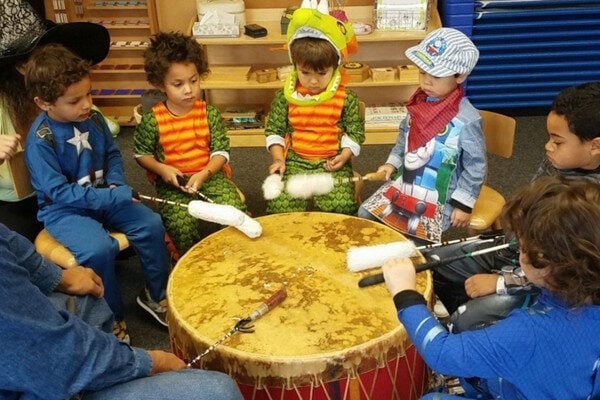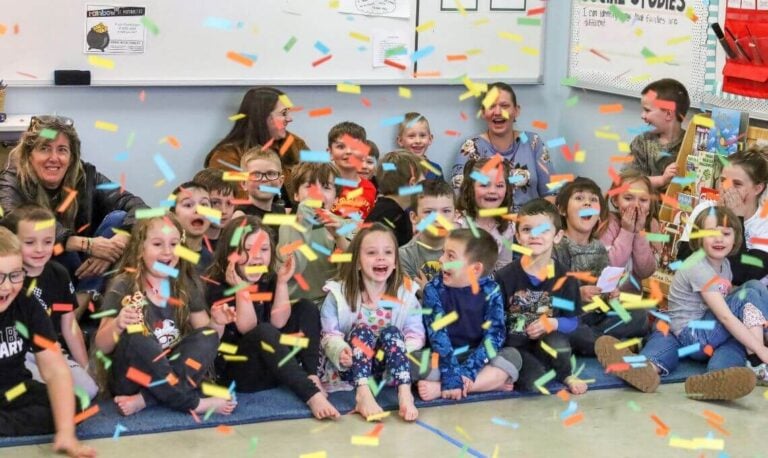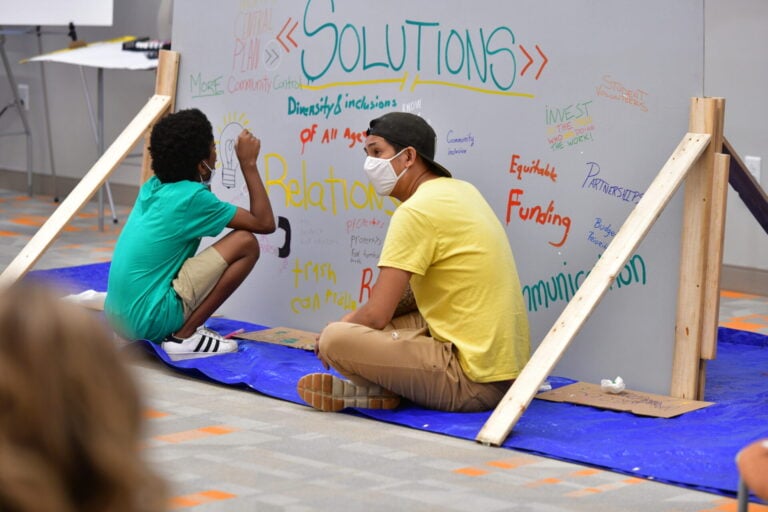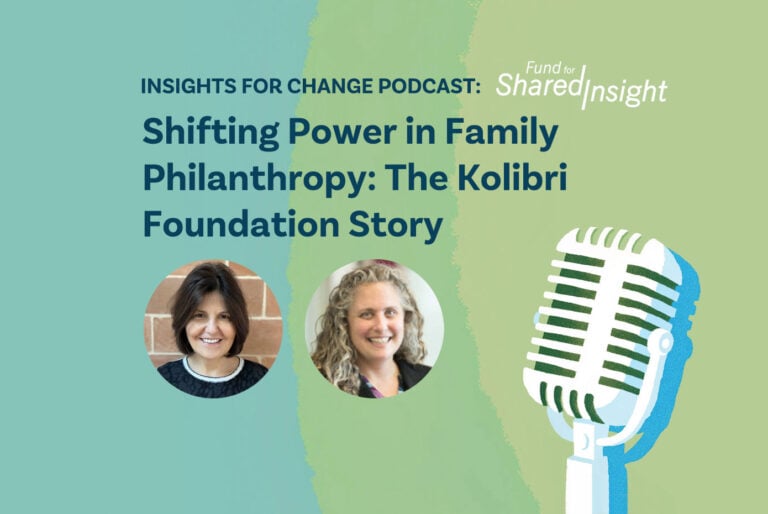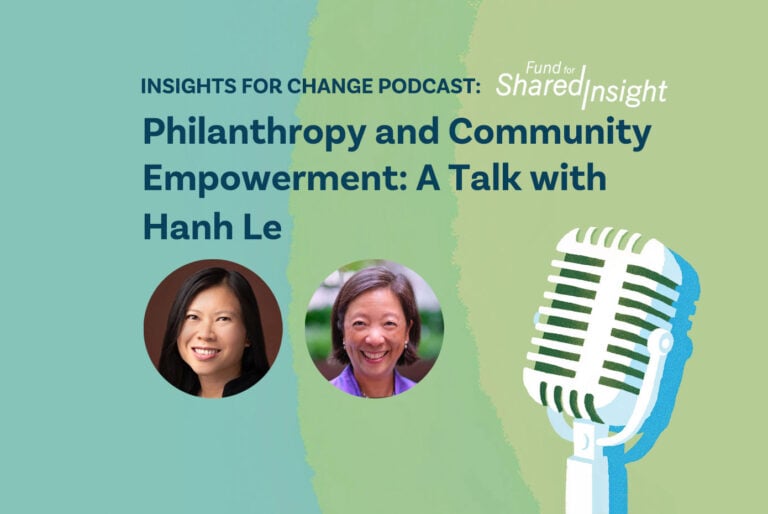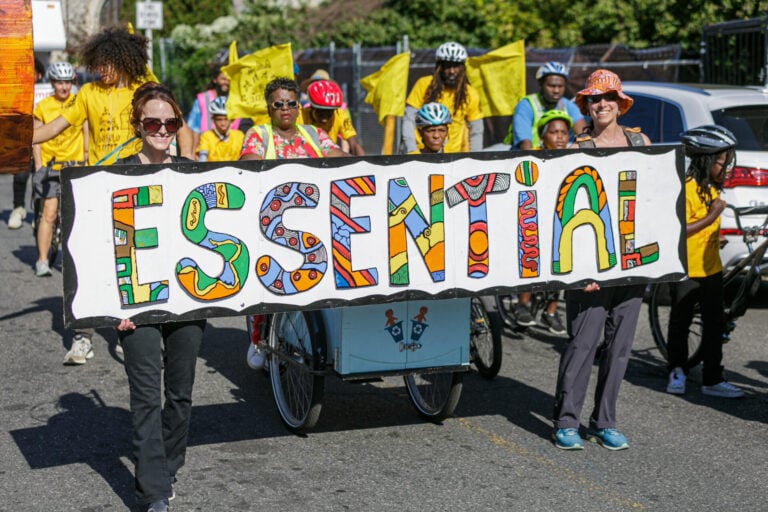Jeanine Valrie Logan is a busy midwife also working to bring a community vision to life: creating a birth center on the South Side of Chicago.
It hasn’t been easy. She had to advocate for the expansion of an Illinois law just so the Chicago South Side Birth Center could operate as a nonprofit birth center, the first in the state. The center’s first building site fell through; and now the second, a former Baptist church, requires extensive renovations. Logan has built up a staff of five to support the center’s development, operations, and community building, but the project is still a steep climb. Fortunately, she says, she has had the team at Chicago Beyond, a national funder based in Chicago, by her side.
Logan is Chicago Beyond’s second Leader in Residence, a program that provides a multiyear fellowship for leaders making an impact in their community. Shruti Jayaraman, Chicago Beyond’s former chief capital and insights officer, describes the program as being “grounded in listening, not just for answers to a predetermined or prescribed question, but listening for the questions that visionary leaders within their own communities hold.”
To identify potential leadership fellows and other people, organizations, and ideas they might want to support, Chicago Beyond team members follow threads from what they hear at community events and meetings and from speaking with existing partners. The team learned about Logan through conversations with a group of street medics, Ujimaa Medics, which Chicago Beyond supported to grow into a full-time operation, providing emergency first response and offering community workshops to teach life-saving skills. The Ujimaa team said Logan had a lot of trust in the birth worker community.
“Another beautiful thing about listening is that things emerge that you couldn’t have predicted,” says Jayaraman.
Another beautiful thing about listening is that things emerge that you couldn’t have predicted
Shruti Jayaraman, Chicago Beyond’s former chief capital and insights officer
Black midwifery as community care
Logan was trained as a doula by an elder midwife, Shafia Monroe, founder of the then International Center for Traditional Childbearing, now SMC Doulas. Logan describes the legacy of Black midwifery as culturally competent, “low-tech, high-touch, relationship-focused care” that understands “the intersections of birth and social injustices.” This means paying attention to a community’s access to green spaces, healthful food, and clean water, as well as experiences of oppression, whether at work, on the train, or in medical settings.
“It’s a very particular training, where we’re basically trying to fortify our community,” she says.
Logan says that she connects with her patients and their families across many levels, beginning with the physiological. Midwives “know what labor looks like, sounds like, smells like even,” she says. “I can walk into a room and say, this person has an infection.” And she says she connects through listening: “When you have more time, more relationship, more trust, more education, people have better outcomes.”
Logan’s vision of creating a birth center on the South Side of Chicago comes from listening to her patients and her community, as well as her own experiences giving birth to three children, two at home and one at a birth center 30 miles from her home in the South Side.
The Illinois Department of Public Health found that between 2018–20, more than 90 percent of all pregnancy-related deaths in the state were preventable, and that Black women were two times as likely to die from pregnancy-related conditions compared with white women. The Chicago South Side Birth Center will offer new access to care in a predominantly Black neighborhood, with providers who are “culturally concordant” with their patients. Logan explains, “There is research that shows when patients have the same race and ethnicity as their provider, their outcomes are better, because that provider sees their auntie, their mother, their sister, in that patient.”
[Logan] thinks of Chicago Beyond’s investment in her as an investment in the desires of the community and its ability to thrive. And she points to Chicago Beyond’s approaches to partnership and leadership development as key factors in the funder’s effectiveness.
Accomplices in community-defined success
Logan describes the experience of working with Chicago Beyond as nurturing her own process of “Afrofuturistic” visioning: “It was a lot of listening to my internal compass, responding to questions that Shruti and my other colleagues had, and then a deep listening for myself. I felt like I was deeply listened to.” Through this process, she says, “We moved from a funder and fundee or grantor and grantee relationship to actual accomplices.”
She thinks of Chicago Beyond’s investment in her as an investment in the desires of the community and its ability to thrive. And she points to Chicago Beyond’s approaches to partnership and leadership development as key factors in the funder’s effectiveness.
Chicago Beyond was founded in 2016 by Liz Dozier, whose leadership as principal of Fenger High School on Chicago’s South Side drew the attention of the philanthropists Kimbra Walter and Mark Walter, co-founder and CEO of the financial services firm Guggenheim Partners. Now Dozier, as Chicago Beyond’s CEO, works with her team to support solutions led by people directly impacted by systemic inequities, including participants in the Leaders in Residence program. With ongoing funding from the Walters, Chicago Beyond so far has invested more than $65 million in more than 200 individuals and organizations. It also develops resources to support its own efforts and those of other funders to shift power to communities in decision making, learning, and grantmaking.
To develop and implement an area of work, the Leader in Residence at Chicago Beyond receives a salary and benefits, as well as paid time off for rest, which Chicago Beyond sees as essential. In addition, the organization offers substantial project funding and tailored support when needs arise. In Logan’s case, Chicago Beyond made an anchor capital commitment to the Chicago South Side Birth Center. It has also provided physical space for meeting and working, connected Logan with accountants and lawyers, and pulled together as a team to help with document preparation during the complex road to becoming the first nonprofit birth center in the state.
Throughout, the Chicago Beyond team has joined Logan and her colleagues in listening to the community at the heart of the Chicago South Side Birth Center. A favorite opportunity for listening comes at the annual Latch and Stroll community event Logan and colleagues host every August at Chicago’s Russell Square Park. Music and food come along with free breast pumps, maternal-health education, and conversations with community members about their questions and priorities around their health and neighborhood.
Multigenerational impact
Jayaraman sees approaches like Chicago Beyond’s Leader in Residence model as one way philanthropy can shift power to community leadership. Working with Logan, she says, has meant learning from the tradition of Black midwifery and building relationships to “come into harmony” with communities. “There is an incredible opportunity for philanthropy to invest in leaders who are building for long-term health,” she says, “and who inspire confidence and resourcefulness and leadership of others from within their own communities, from what they know and see.”
At the same time, says Dozier, the Leader in Residence program has “incredibly grown our capacity as a funder.” Building on what they have learned from working with Logan, Chicago Beyond recently announced a new national Fellowship for Black Maternal Health, with inaugural Fellows from Florida, Massachusetts, Tennessee, and Texas. Each Fellow will receive an unrestricted grant of $500,000 over three years, along with other support for their leadership. “Our hope is that the fellowship serves as an inspiration for what funding maternal health can look like in communities nationwide,” Dozier says.
Meanwhile, Chicago South Side Birth Center has been awarded $3.3 million from the Chicago Department of Planning and Development’s Community Development Grant program to complete renovations on their site.
Logan envisions that as birth centers grow in communities around the country, their impact will spread, from healthier births to education about breastfeeding and maternal health, and to shared attention to the many factors that contribute to family and community health. When she looks at her children and their friends, she says she sees the ripple effects that will come from growing up with the Chicago South Side Birth Center as part of their neighborhood. “I think about the intergenerational legacy of what birth can look like,” Logan says. “It can literally change your whole family’s life and legacy for generations to come.”
Resources:
- Learn more about Chicago Beyond’s Leadership in Residence model
- Use Chicago Beyond’s Mirror Tool to reflect on unintended bias in evaluating funding applications.
- Read Chicago Beyond’s report Why Am I Always Being Researched? for reflections on using an equity-based approach to research to shift power to communities

